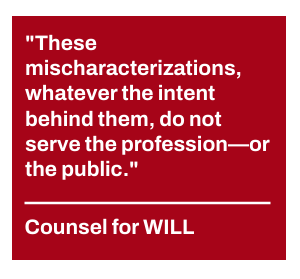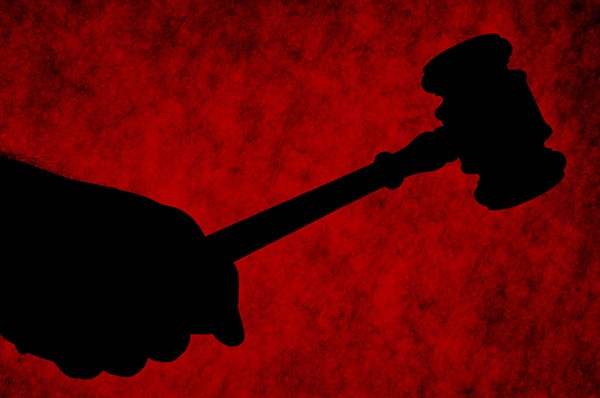Amended complaint filed in federal court against State Bar of Wisconsin seeks punitive damages
By: Steve Schuster, [email protected]//May 2, 2024//
Amended complaint filed in federal court against State Bar of Wisconsin seeks punitive damages
By: Steve Schuster, [email protected]//May 2, 2024//
On Tuesday, April 30, 2024, an amended complaint was filed in federal court against the State Bar of Wisconsin by the Wisconsin Institute for Law & Liberty.
According to a copy of the amended complaint obtained by the Wisconsin Law Journal, the State Bar of Wisconsin, a state agency created by the Wisconsin Supreme Court, administers and promotes a “Leadership Development Summit” and a “Leadership Academy,” which together have doled out training to hundreds of attorneys. These programs confer a credential, offering a privileged path to coveted leadership positions.
The amended complaint notes the Mentoring Program requires would-be mentees and mentors to explain on the application form how they support so-called diversity, equity and inclusion.
“The (State Bar) programs are illegal. The Fourteenth Amendment to the United States Constitution mandates that educational opportunities “must be made available to all on equal terms,” the complaint states.
“The programs discriminate against attorneys based on unlawful classifications, thereby violating attorneys’ rights secured by the Equal Protection
Clause of the Fourteenth Amendment. Plaintiff cannot be compelled to support unconstitutional programs,” the complaint also notes.
The complaint lists a number of articles and social media posts published by the State Bar of Wisconsin that are allegedly illegal and discriminatory in nature.
The complaint also takes notice of alleged issues of transparency within the entire organization.
“The Bar also does not permit members to access records that are reasonably necessary for those members to understand whether activities have been incorrectly classified as chargeable,” the complaint states.
Skylar Croy, an attorney at WILL, said the intent behind the amended complaint is not to clarify the settlement, which both parties see differently.
Croy noted, under the settlement, WILL retained the right to continue a lawsuit against the State Bar of Wisconsin as long as WILL did not further challenge the clerkship program.
“So we are continuing the lawsuit, largely about these leadership programs,” Croy said, noting WILL does not reference the clerkship program in the amended complaint.
“After our client entered into a partial settlement, the State Bar took the position that it does not use race in its Diversity Clerkship Program and declared victory. It turns out this wasn’t true. As detailed in our new complaint, the Bar has other programs that use race. The Bar explicitly asks about race on its application forms for leadership programs, and that is illegal. We will now continue this lawsuit over those programs, said Croy during an interview with the Wisconsin Law Journal on Wednesday.
The Wisconsin Law Journal emailed the State Bar of Wisconsin on Tuesday and Wednesday and did not receive a response prior to publication on Thursday morning.
The complaint ultimately requests relief.


As previously reported by the Wisconsin Law Journal, the State Bar of Wisconsin received a letter in April from attorneys at WILL, according to counsel from WILL, who noted future litigation is anticipated against the Wisconsin State Bar if it fails to comply with the terms of the settlement agreement.
The letter was in response to the State Bar‘s allegedly false statements made that State Bar’s Diversity program would be unchanged.
“Certain comments being made by the State Bar in the wake of the settlement in the Suhr matter have come to my attention. The Bar is apparently taking the position that its diversity clerkship program will “continue unchanged.” For the Bar’s sake, I certainly hope not. The State Bar is both constitutionally and statutorily forbidden from using race as a factor in selecting students for clerkships,” wrote Rick Esenberg, president and general counsel for the Wisconsin Institute for Law & Liberty in the letter to the State Bar.
“The State Bar of Wisconsin’s Diversity Clerkship Program will continue UNCHANGED,” the State Bar posted on X (formerly known as Twitter) in April.
In response, Esenberg wrote, ” ‘Unchanged’ would not seem to be an accurate description of this change. But if that’s all that happened, this letter might be unnecessary.”
According to the terms of the settlement, the State Bar had agreed to change its definition of diversity.
“The new definition, which the bar has agreed to, expressly states that decisions will be made “without regard to stereotypes,” Esenberg added.
Esenberg continued, “So, no, the bar is not going to proceed ‘unchanged.’ That is particularly so in light of this morning’s statement. It has all but announced its intent to break the law by suggesting that the characteristics that it will consider are those that are legally forbidden. This morning’s statement will be Exhibit A in any ensuing litigation.”
Mischaracterization, according to WILL
Attorneys for WILL say that the State Bar of Wisconsin has mischaracterized the terms of the settlement agreement in statements made to the Wisconsin Law Journal, on social media as well as on the State Bar’s own website.
“Perhaps the Bar is permitted to mischaracterize the settlement and even the Constitution,” Esenberg wrote in the letter.
During an interview with the Wisconsin Law Journal in April, attorneys for WILL elaborated on the statements in the letter.
When asked by the Wisconsin Law Journal if the State Bar intentionally lied and deceived members, WILL responded, “The bar’s purpose is to regulate and improve the legal profession. The bar’s attempt to save face is not germane to either. These mischaracterizations, whatever the intent behind them, do not serve the profession—or the public.”
In anticipation of more litigation

Attorneys for WILL said they are considering seeking additional legal remedies against the State Bar of Wisconsin to make sure it follows the spirit of the settlement agreement.
“We may go to court to enforce the settlement agreement,” counsel for Will said Tuesday.
“Additionally, there are many attorneys in Wisconsin who could copy and paste the complaint and file another lawsuit,” WILL attorneys noted.
“Given the bar’s statements, another lawsuit is possible — maybe even likely. We hope that the bar will work with us to correct its illegal behavior so that further legal action is not necessary. The bottom line is, the bar is not off the hook yet,” attorneys for WILL added.
In April, the State Bar of Wisconsin issued a statement to the Wisconsin Law Journal.
“All first-year law students are eligible for the Diversity Clerkship Program. Race has not and is not used as a factor in making decisions about program applicants. This is what the State Bar has tried to explain to WILL all along, even prior to the filing of their federal lawsuit in December. WILL’s press release about the settlement suggested the State Bar was abandoning the program. The State Bar’s response was to clear the record and let members know the Diversity Clerkship Program is continuing, despite WILL’s communications about the program,” the State Bar said.
“The State Bar contacted the Wisconsin Law Journal to update the article with proper attribution to statements made by WILL, and to include the State Bar’s responses. The Wisconsin Law Journal did so in an updated version of the story,” the State Bar added.
Both sides (WILL and the State Bar) are claiming a victory in the recently achieved settlement.
Also in April, the State Bar of Wisconsin published an article ‘State Bar Successfully Defends Diversity Clerkship Program: Settlement Agreement Explained.”
The article begins with “FACT: The State Bar of Wisconsin’s Diversity Clerkship Program will continue unchanged, despite what the Wisconsin Institute for Law and Liberty (WILL) is publicly claiming. WILL’s most recent headline says, “Victory: State Bar Abandons DEI Program After WILL Lawsuit,” suggesting the Diversity Clerkship Program will not continue or is suspended. In fact, the State Bar’s Diversity Clerkship Program is continuing without any change in its operation. The only change is the wording of the definition of “diversity.” This article provides facts on the settlement agreement.”
However, WILL contends that that was not at all what was in the spirit of the settlement agreement.
On April 4, WILL published a statement, “Victory: State Bar abandons DEI Program after WILL lawsuit.
Also as previously reported by the Wisconsin Law Journal, the State Bar of Wisconsin and WILL reached a partial settlement agreement.
However, it would appear there is not a meeting of the minds as to what the settlement actually means.
In April, a WILL spokesperson said the settlement is effectively “ending discriminatory DEI practices at the State Bar.”
However, in response, the State Bar of Wisconsin said, “The State Bar’s Diversity Clerkship program does not discriminate based on race. There were no discriminatory practices to begin with, which the settlement acknowledges. Nothing about the program is changing besides a change to the definition of ‘diversity.’ The Diversity Clerkship Program will continue unchanged under the settlement.”
“Now, our client’s mandatory and annual State Bar dues will not fund internships and policies primarily based on race, but rather on merit and diversity of viewpoint,” WILL officials added.
In response, the State Bar of Wisconsin said, “The State Bar does not fund internships or policies based on race. The Diversity Clerkship Program does not discriminate based on race, which the settlement agreement acknowledges.”
“Defeating unconstitutional DEI programs has become WILL’s area of expertise, and we are not stopping here. While we are pleased with this victory, we know the fight is far from over. In fact, this is only the beginning of a movement, and our lawsuit will provide a roadmap for future victories in all 50 states,” said WILL Associate Counsel Skylar Croy.
The State Bar responded, “The State Bar’s Diversity Clerkship Program is not unconstitutional, which is why the program will continue to operate unchanged. The only change is the updated definition of “diversity” on the program webpage and other Diversity Clerkship Program materials. The settlement, and the dismissal of claims against the Diversity Clerkship Program, acknowledges that WILL now understands that the State Bar’s Diversity Clerkship Program fully complies with the law.”
Several University of Wisconsin-Madison law students commented on the settlement.
“This settlement brings a much-needed change to the Diversity Clerkship Program as it will now give all law students an equal opportunity. Diversity programs must consider much more than one’s race and sex in their candidate evaluations. True diversity lies within one’s individual experiences and the unique perspectives one can offer,” said UW Law Student Samatha Crane.
UW Law Student George Clark agreed.
“This settlement offers all students — regardless of race — a fair shot at competitive opportunities. There is much work to do, but I am optimistic the Wisconsin State Bar will follow the law. Hopefully, the Bar will care more about having greater diversity of thought rather than hitting quotas,” Clark said.
As previously reported by the Wisconsin Law Journal, University of Wisconsin-Madison clinical law professor Steven Wright, who serves faculty advisor to the school’s Black Law Student Association, sent a scathing email to UW Law students over Christmas break warning students not to participate in the State Bar of Wisconsin’s Diversity Clerkship “Sh*tty program,” that has been recently subject to a Federal Lawsuit.
“I strongly encourage you not to participate in this sh*tty program that rarely admits people who look like us and that will no doubt share all your private information with plaintiffs hostile to your interests,” Wright wrote in his December 2023 email.
In Wright’s email to students he noted the State Bar of Wisconsin’s 2023 diversity clerkship program accepted 25 members, only one of whom was a black UW law student.
Legal News
- Former prosecutor suspended for unwelcome contact during legal conference
- One Wisconsin Attorney’s misconduct ‘in a league of its own’
- Wisconsin election fraud charge issued from November 2022 general election
- Indigenous consultant accuses NHL’s Blackhawks of fraud, sexual harassment
- Man pleads guilty in theft of Arnold Palmer green jacket, other Masters memorabilia from Augusta
- KS Governor cites competition concerns while vetoing measure for school gun-detection technology
- U.S. Attorney Gregory J. Haanstad recognizes service and sacrifice of federal, state, local, and Tribal law enforcement
- Gov. Evers calls special elections for the 4th Senate District and 8th Congressional District
- Wisconsin GOP-led Senate votes to override nine Evers vetoes in mostly symbolic action
- Bill to curb mask-wearing at protests could make it illegal for medical reasons too
- University board slashes diversity program funding to divert money to public safety resources
- Second defendant convicted in Fond du Lac 2016 firebombing
WLJ People
- Power 30 Personal Injury Attorneys – Russell Nicolet
- Power 30 Personal Injury Attorneys – Benjamin Nicolet
- Power 30 Personal Injury Attorneys – Dustin T. Woehl
- Power 30 Personal Injury Attorneys – Katherine Metzger
- Power 30 Personal Injury Attorneys – Joseph Ryan
- Power 30 Personal Injury Attorneys – James M. Ryan
- Power 30 Personal Injury Attorneys – Dana Wachs
- Power 30 Personal Injury Attorneys – Mark L. Thomsen
- Power 30 Personal Injury Attorneys – Matthew Lein
- Power 30 Personal Injury Attorneys – Jeffrey A. Pitman
- Power 30 Personal Injury Attorneys – William Pemberton
- Power 30 Personal Injury Attorneys – Howard S. Sicula













